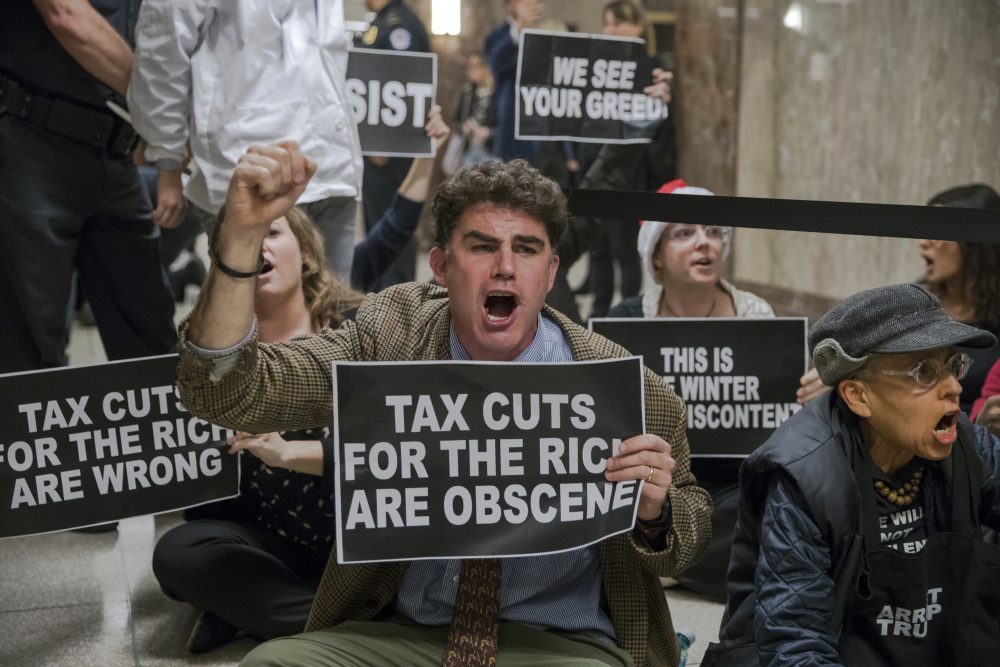Advertisement
Will The Republican Tax Plan Contribute To Inequality?
Resume
This week on Freak Out And Carry On, Ron Suskind and Heather Cox Richardson talk with Jim Tankersley, tax and economics reporter at the New York Times. They discuss the House and Senate versions of the Republican tax bills, the impact the proposed reforms will have on our economy, and how it will contribute to economic inequality.
"I have not seen an analysis yet that suggests that this tax bill will make inequality better," said Tankersley. "I've seen a lot of analyses and talked to a lot of economists who think it will make it worse."
Later, Heather answered a history question from a listener. If you want to ask Heather a history question find us on facebook or twitter.
Excerpts
Ron Suskind: This tax bill is seen by many as an abomination, as a refutation of so much that seemed to define that great populist surge on both the left and the right during this election. Leading up to this moment we have seen three decades of deepening and growing inequality. In some ways, the issue that defines almost all the other issues. The average college graduate today enters the workforce $34,000 in the red. At this moment we're considering a bill that could increase the deficit by more than $1.4 trillion. The Joint Committee on Taxation says under the Senate plan the rich would get a tax cut while families earning $10-$75,000-a-year will actually get a tax increase, over 10 years as this bill unfolds. Think of that family. They are real people. And now we're supposed to believe they need to pay more in taxes while Ivanka Trump should inherit more money--limitless amounts under the House bill, up to $22 million exempted under the Senate bill.
Heather Cox Richardson: I cannot emphasize how important this tax bill is. What this law does is it repeals the New Deal. We get rid of the New Deal concept that the government has a responsibility to do what is best for everybody, to try and promote economic opportunity across the board. And it replaces it with a new ideology that says the best way to make a healthy society is to make sure people at the very top have control of the money, the political system, the judicial system. Because they are the ones who truly understand how best to advance a society. It's a revolution that's been coming a long time and the Republicans have made no secret of the fact this has been their goal. They want to get the government out of regulations and get it out of any kind of social welfare legislation. That has been a primary goal of the Republican Party since Ronald Reagan took office in the 1980s. But to see it happen here is simply breathtaking.
Jim Tankersley: The vast preponderance of the benefits go to the wealthy. That's true. In fairness, it's the wealthy who pay the bulk of taxes in the United States. But they get the most tax relief, not just in dollar figures, but as a percent of their overall income as well. Their incomes go up by more than the people below them. For most people in the middle class they get a tax cut. They're going to get higher incomes next year based on what's in both the House and the Senate bills. But not for everybody in the middle class. You still have a few million families--and the Senate is a little smaller than the House bill--but millions of families will see a tax increase on the middle class. And then more in the upper middle class because both get rid of some popular deductions and can end up raising taxes because of it.
Heather Cox Richardson: But Jim how much of this is classic Republican tax policy, the kind of stuff we've been seeing since Ronald Reagan, and how much of it is new in this era of Donald Trump?
Jim Tankersley: Now I do think this is a good point that you bring up. There is a difference between the supply side economics of Ronald Reagan and the supply side economics of Donald Trump. There's a lot in here that punishes areas that didn't vote for Donald Trump, whether that's intended or not. The limitation of the deduction of state and local taxes really hurts high tax blue states, big urban areas that did not vote for Donald Trump. But I think the bigger and more important difference with Reagan's supply side economics is that this bill isn't a bet on giving money directly to rich people but on giving money to business which will then give money to rich people. It's more of a bank shot. The idea is that Trump's been promising this huge middle class tax cut. This is not a huge middle class tax cut.
Ron Suskind: So here we are at a moment in which Donald Trump clearly rose with a big dollop of populism that Republicans tend not to have grabbed hold of up to now. At the heart of this Jim, is this in any way a counterforce, in terms of tax policy, to this powerful and growing inequality in the country?
Jim Tankersley: I have not seen an analysis yet that suggests that this tax bill will make inequality better. I've seen a lot of analyses and talked to a lot of economists who think it will make it worse. And you can pretty easily see why that would be. It's going to give a lot of money to people who already have a lot of money. And there's also this argument that the conservative economists make. That is that the inequality won't matter if you're raising living standards across the board. If people in the middle class get big wage increases the they're not going to care if inequality goes up. Inequality went up in the late 90s and people weren't that upset about it because everybody was getting a raise.
The views and opinions expressed in this podcast are solely those of the participants and do not in any way reflect the views of WBUR management or its employees.
